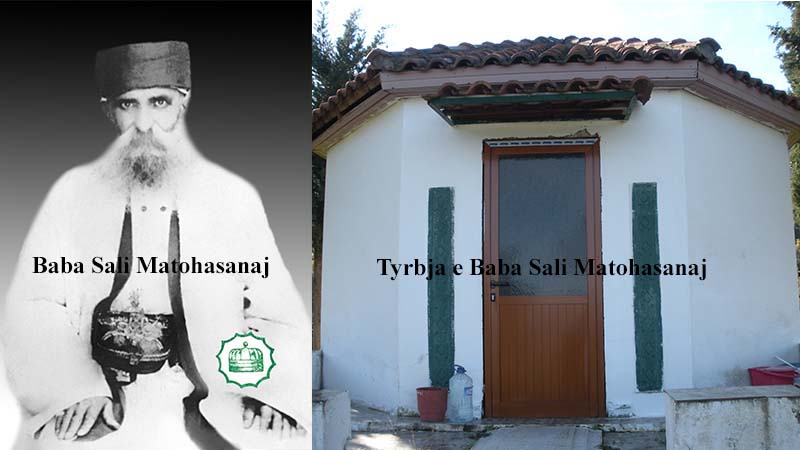
Matohasanaj, has an early history of the spread of Bektashism, where traces appear on the Saltik stone on Mount Griba, above the village and, its continuation, with Këndevica. There are other traces of faith, in Pisha, ‘Good Place’, Shkallza at the top of the mountain above Dhëmblan.
The tekke was originally founded by father Salih Matohasanaj, in his house and, later, the building was erected. The Bektashi tekke was closely associated with Baba Saliu’s personality. Baba Saliu was born in the same village, in the second half of the 19th century. Still young, he joined the Bektashi order. After the annexation of Prizren (1878), in this tekke, the teaching of the Albanian language was secretly taught. Baba Saliu taught the children of the village and established a school with his own funds, where the teacher was Feim Çami. Lopsi’s nobility were educated in this school, such as Veis Arifi, Ismail Kasua, Zenel Fetahu, Mersin Meçja, Ali Veizi, Dulja and many others. The tekke became known in the Kurvelesh area for its Bektashi and patriotic devotion.
Baba Rexhebi tells how he brought books from Istanbul through Tripoli, Libya, from where, with the help of the local governor, Rexhep Pasha Mati, he dropped them in Albania and distributed them in southern Albania. . In 1902, in the province of Kudhes of Vlora, he was reported to the Turkish authorities by spies, arrested and imprisoned for a long time in Libya. Here he translated Fuzuli’s “Hadika” into the lab dialect. Dhimitër S. Shuteriqi shows that the manuscript of this translation remained until 1950 in the tekke of Baba Saliu, in Matohasanaj. The tekke helped in the anti-fascist war (1939-19944), for which it was burned and looted by the occupiers in June 1944. The following clerics served in this tekke: father Sali Matohasanaj, dervish Xhemal Alizoti (1939-1950), father Sherif Manaj (1950 -1967). The tekke was closed by the monist system in 1967. Baba Sherif Manaj stayed at the house of Besim Velikos and the house of his niece, Zyhras until his death in 1998. The tekke reopened after 1990. Also in October 2004, it was reopened a beautiful tyrbe where the remains of father Sherif Manaj, father Saliu, father Xhemali are buried.
Greetings from the Bektashi World Leader,
Haxhi Dede Edmond Brahimaj on the 150th anniversary
of the establishment of the Matohasanaj tekke in Tepelena
In the name of God, the Beneficent, the Merciful!
Dear brothers, thousands of Bektashi clerics and believers!
Dear intellectuals and family members of father Sali Matohasanaj!
It is a pleasure to commemorate the 150th anniversary of the founding of the Matohasanaj tekke in Tepelena. Its founder, Father Sali Matohasanaj, is a prominent Bektashi cleric with a major contribution to the national renaissance. Baba Sali Matohasanaj has today taken his deserved place in the pantheon of bright figures of Albanian and world Bektashism. The fact that we commemorate the 150th anniversary of the founding of this tekke, made us proud in remembrance of his work, in the mission of faith in God and love for the homeland. At the end of the 19th century, when the contribution of father Saliu really stood out, Bektashism in the Albanian territories was at the peak of its development. Taking occasion from the support that Ali Pasha Tepelena gave to the Bektashi tekkes, in the face of the anti-Bektashi offensive coming from the High Gate, the clerics of those years tried by all means to be at the top of the Albanian autonomous movements, for the freedom of Albania.
In the years when father Saliu opened the tekke in Matohasaj, father Shaban Prishta and father Meleq Shëmbërdhenji, distributed Albanian books secretly and, the sons of Skrapar and Gramsh, learned the Albanian language. Father Ahmet Turani and father Medin Gllava spread the word of Haxhi Bektash Veliu in Tepelena and Mallakastër. In the tekkes of Kruja, Berat, Korça, Elbasan, Dibra, they followed the inspirer of the Albanian League of Prizren, the Bektashi Abdyl Frashëri, from Dibra to Ioannina. This spirit of the purest national feelings, would follow from father Sali Matohasanaj, manning him ahead of time, sharpening his gaze and making him drink from the inexhaustible well of wisdom of the Prophet Muhammad, (peace be upon him), from the boundless knowledge of our twelve Imams, from the almost emblematic ingenuity of our dervishes and fathers.
The famous motto “Without Nation there is no religion”, was the motto of all Albanian Bektashis. On this anniversary of the Matohasanaj tekke, let us convey at this end of the year love and kindness to all Albanian families and all Bektashi families in the world, wishing you all peace and harmony and facing the pandemic at the lowest possible cost.
God bless you all!
Amen!
